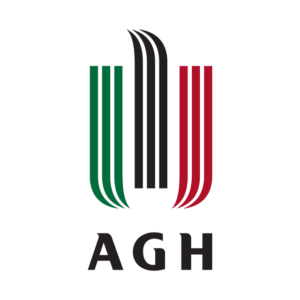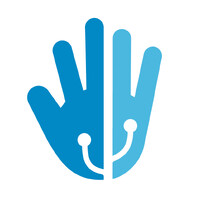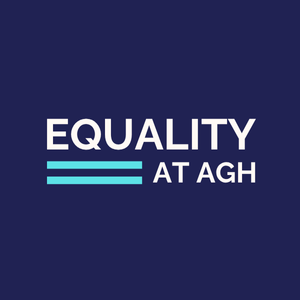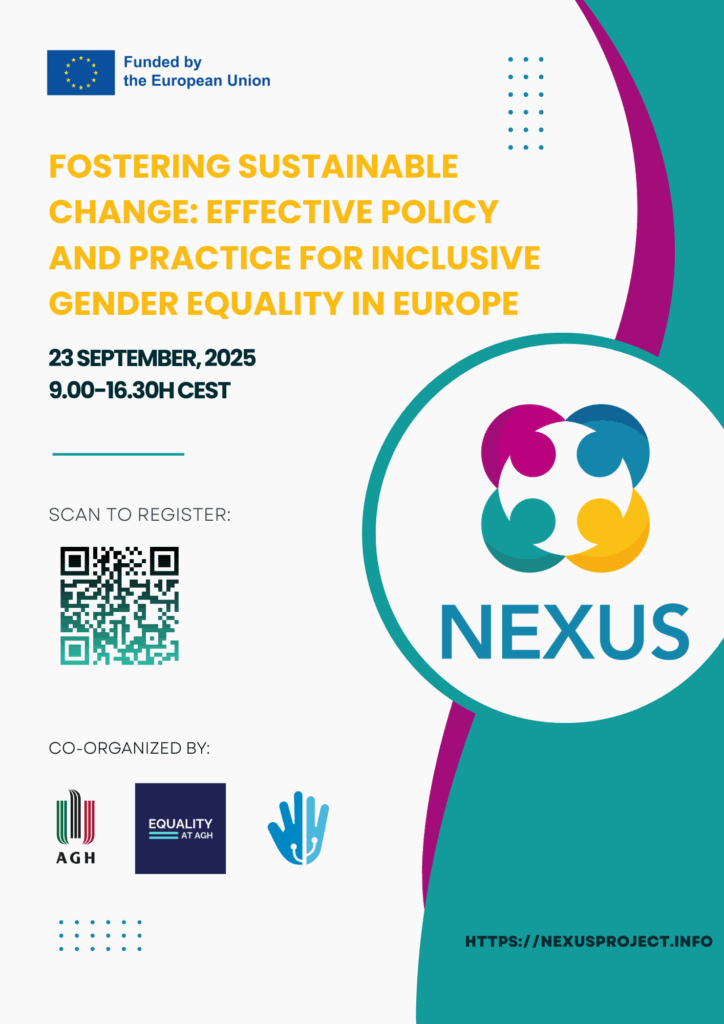Category: News
Launch the Bystander Intervention Awareness Training
🎉 We’re excited to!
As part of the NEXUS project, and in collaboration with our twin trio partners TU Dublin, Koç University, and Sofia University, this training aims to raise awareness and build practical skills to recognize and safely respond to instances of gender-based violence in academic and research settings.
🧠 Through this module, participants will:
-
Understand the role of bystanders in preventing GBV
-
Learn strategies for safe and effective intervention
-
Promote a culture of accountability and zero tolerance
The training is now available online and free of charge. Whether you’re a student, researcher, or staff member, your participation makes a difference.
Link: https://nexusproject.info/slide1/
👉 Stay tuned for access details and help us build safer, more inclusive academic environments!
#NEXUS #GenderEquality #BystanderIntervention #HorizonEU #EndGBV #InclusionInAcademia #HigherEd #SafeCampus
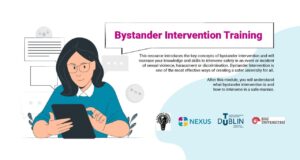
Аrticle by Londa Schiebinger
We are thrilled to present an article, which is authored by Londa
Schiebinger, the John L. Hinds Professor of History of Science at Stanford
University and Director of the Gendered Innovations in Science, Health &
Medicine, Engineering, and Environment Project. She emphasizes the
importance of using intersectional analysis in STEM fields to uncover
hidden biases and produce more equitable and accurate research outcomes.
Link:
https://history.stanford.edu/news/intersectional-analysis-science-and-technology
#EUScienceResearchandInnovation
📢 NEXUS Newsletter #7 is Now Available!
We’re excited to announce the release of the seventh edition of the NEXUS Newsletter, bringing you the latest updates and insights from our ongoing efforts to promote gender equality and intersectionality in research and academia.
In this issue, you’ll find:
-
Highlights from Recent Events: Discover the key takeaways from our latest workshops and conferences.
-
New Resources and Tools: Learn about the latest tools developed to support inclusive practices in research institutions.
-
Spotlight on Partner Initiatives: Get inspired by the innovative approaches our partners are implementing to foster equality.
-
Upcoming Opportunities: Stay informed about upcoming events, calls for participation, and funding opportunities.
📩 Read the full newsletter here: NEXUS Newsletter #7
Stay connected and join us in our mission to create more inclusive and equitable research environments.
#NEXUSNewsletter #GenderEquality #Intersectionality #InclusiveResearch #HorizonEurope #NEXUSProject #EUScienceResearchandInnovation
Final Conference on EU Science, Research & Innovation!
The NEXUS Toolkit is designed to support Higher Education and Research and Innovation organisations
The NEXUS Toolkit is designed to support Higher Education and Research and Innovation organisations in advancing their Gender Equality Plans in intersectional and intersectoral directions.
It gathers the resources, tools and capacity building materials developed in the NEXUS Project and includes input for designing innovative actions, monitoring and evaluating their implementation, integrating the gender+ dimension in research, and countering gender-based violence in academia.
The NEXUS toolkit is compiled by the Smart Venice team, with contributions from NEXUS partners and references to external resources.
#EUScience,ResearchandInnovation
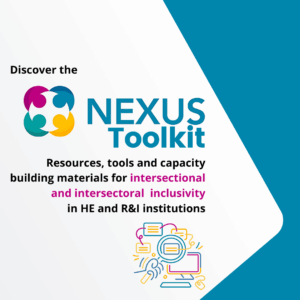
📢 Upcoming NEXUS Webinar – Save the Date!
We’re excited to share the dissemination materials for the upcoming NEXUS Webinar, titled:
“Revisiting AI Research and Teaching: Integrating Gender and Intersectional Perspectives”
🗓 Date: 20 May 2025
🕚 Time: 11:00–12:30 CEST
🤝 Organised in collaboration with: BIAS and AEQUITAS projects
This thought-provoking session will explore how to embed gender and intersectional thinking into AI-related research and education.
📌 Registration link: https://us02web.zoom.us/meeting/register/N7yhzWKKTymJGIs72mvfXA !
#NEXUSWebinar #AIandGender #Intersectionality #HorizonEurope #BIASproject #AEQUITASproject #EUScience,ResearchandInnovation
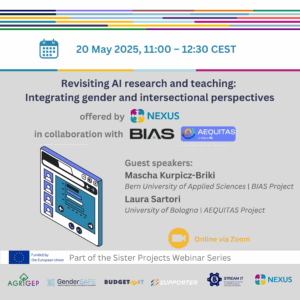
🎉 NEXUS Newsletter #6 is out now!
In this latest edition, we bring you exciting updates from across the NEXUS project network — featuring highlights from recent trainings, conferences, and podcast episodes. You’ll find insights on gender equality in academia, intersectional policy development, institutional actions, and collaborative initiatives with our sister projects.
🔍 Don’t miss:
✔️ Updates from the field
✔️ Spotlight on inclusive institutional change
✔️ Voices from our partners and podcast guests
📩 Read the full newsletter here:
#NEXUSProject #GenderEquality #Intersectionality #InclusiveAcademia #Newsletter #HorizonEurope #EU Science, Research and Innovation
🎙️ New NEXUS Podcast Episode!
We’re joined by Dr. Grace Idahosa (University of Cambridge) to explore agency, belonging, and transformation in Higher Education 🌍📚
With insights from South Africa, India & Northern Ireland, we dive into: 🔹 Feminist & decolonial thought
🔹 Inequality in academia
🔹 Strategies for inclusive change
Don’t miss this thought-provoking conversation!
🎧 Listen now: https://www.youtube.com/watch?v=te3SYyq9e-c&t=746s
EU Science, Research and Innovation ;
Great news — NEXUS Newsletter #5 is out now! 🎉
In this issue, you’ll find exciting updates from the NEXUS project, including highlights from recent events, podcasts, trainings, and institutional actions for gender equality and inclusion. Don’t miss out on insights from our partners across Europe, spotlight stories, and upcoming activities shaping the future of inclusive research environments.
📩 Check it out and stay connected with the latest from NEXUS:

